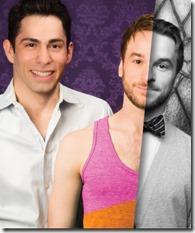
The Pride
Written by Alexi Kaye Campbell
Directed by Bonnie Metzgar
R. Christiansen Theater, 2433 N. Lincoln (map)
thru July 13 | tickets: $30 | more info
Check for half-price tickets
Read entire review
Out of the closet and into the loo
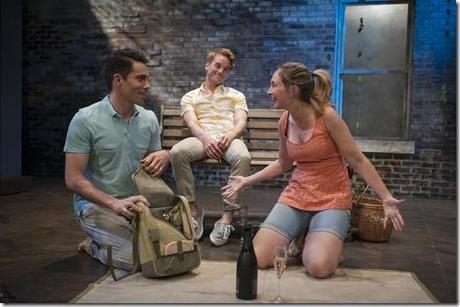
About Face Theatre presents
The Pride
Review by John Olson
“Times…have changed…” So goes the opening of the Cole Porter song “Anything Goes.” Alexi Kaye Campbell’s play, which opened in London in 2008, makes that point boldly by juxtaposing two stories of gay men in the UK – one in 1958 and one in 2008. He also explores the idea that in terms of gay sexuality in the early 21st Century, “anything goes,” but asks if that’s right. His three major characters in each story, who are played by the same three actors (and have the same names in each story) ponder the question of whether and in what ways men should have sex with men. In 1958 the masculine and closeted Philip (John Francisco) is married to Sylvia (Jessie Fisher), but attracted to her employer Oliver (Patrick Andrews) and hates himself for it. In 2008, a different Oliver (still Andrews) has just broken up with his likable, mildly effeminate boyfriend of a year and a half, Philip (Francisco). The deal killer between them is Oliver’s addiction to anonymous sex liaisons in places like public restrooms. In the week leading up to a London gay pride celebration, Oliver seeks reconciliation with Philip and support from straight gal pal Sylvia (Fisher). Sylvia’s only concern about Oliver’s hookups with strangers is that these men might have objectionable moral or political values and thus not be not worthy of his affections.
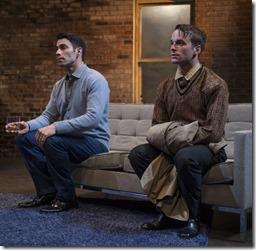
The playwright makes these points with dialog that in the 1958 scenes is frequently poetic and in the 2008 scenes often brilliantly funny. Under Bonnie Metzgar’s impeccable direction, the emotional moments are heartbreaking and the comic situations all land. On the poetic side, the 1958 Oliver speaks of a more tolerant future when people will better understand the nature of homosexuality and be better off for that understanding. Another sad and touching moment is hearing the Sylvia of the 1950s describe herself as a “woman who has forgotten herself and is forgotten.” Campbell’s humor is equally effective. In 2008, Oliver’s encounter with a rent boy (Sprunger) who poses for him as a Nazi becomes dryly funny when Sprunger’s character reveals himself to be an insecure and struggling actor – hardly the dominating figure of Oliver’s fantasies. Sprunger’s equally funny as the magazine editor hiring Oliver to write an article on “gay sex from a straight perspective” and he chillingly shows his versatility, in a third role – as a doctor in 1958 who administers aversion therapy to gays who wish to become straight. The Equity and Equity-quality actors (two are Union members, two aren’t) all impress. Andrews is gently sensitive as the 1958 Oliver, and amusingly anxious as his 2008 counterpart struggling with his sexual addiction even as he enjoys it so much. The contrast between Francisco’s opaque and “veddy” British upper class man and his mildly queeny contemporary character is striking. Fisher is heartbreaking as the mid-Century wife who discovers her husband’s secret and a welcome voice of reason in the 2008 scenes.
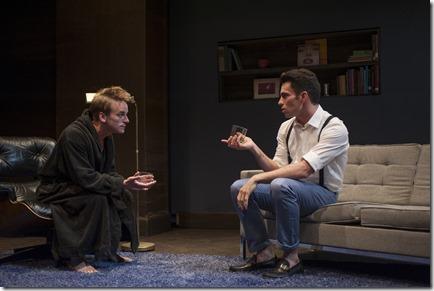
This play is the work of a very gifted writer, exquisitely executed by cast and director, but Campbell falls short in creating a compelling story around his worthy themes and sometimes intriguing situations. Once the play’s premise is set up, it was not hard to guess that the 1958 story was not going to end well. And, I never got very interested in what was going to happen to the 2008 characters, which as it turns out is not very much. None of the three in 1958 really earned my empathy: Oliver was self-centered and seemed to be going nowhere, while Sylvia and Philip had already made good choices in moving on from their relationships with him. While many of the individual moments of the play are enjoyable, on the whole it does not have an engrossing arc.
Even with these flaws, it’s an important addition to gay drama as a step forward beyond the much-explored themes of coming out and the AIDS crisis that have been prevalent in recent decades. Even as gays and lesbians gain greater acceptance and (for better or worse, depending on one’s perspective) assimilation, there are issues that are unique to this community and ripe for exploration in literature. Just as The Pride takes a look backwards at how far we’ve come, it suggests some directions for gay literature as the GLBT community moves into a new, more accepting era.
Rating: ★★★
The Pride continues through July 13th at Victory Gardens Richard Christiansen Theater, 2433 N. Lincoln (map), with performances Thursdays and Fridays at 7:30pm, Saturdays at 5 and 9pm, Sundays 9pm (no performance on July 4th). Tickets are $30, and are available by phone (773-871-3000) or online through VictoryGardens.org (check for half-price tickets at Goldstar.com). More information at AboutFaceTheatre.com. (Running time: 2 hours 20 minutes, includes an intermission)
Photos by Michael Brosilow
artists
cast
Patrick Andrews (Oliver), John Francisco (Philip), Benjamin Sprunger (Man, Peter, Doctor), Jessie Fisher (Sylvia).
behind the scenes
Bonnie Metzgar (director), William Boles (scenic design), Becca Jeffords (lighting design), Stephen Ptacek (sound design), Mieka van der Ploeg (costume design), Jamie Karas (props designer), John Tovar (fight director), Anita Deely (dialect coach), Hutch Pimentel (asst. director), Derek Matson (dramaturg), Michael Brosilow (photos)
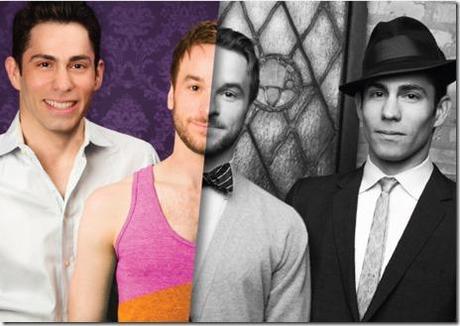
13-0623

